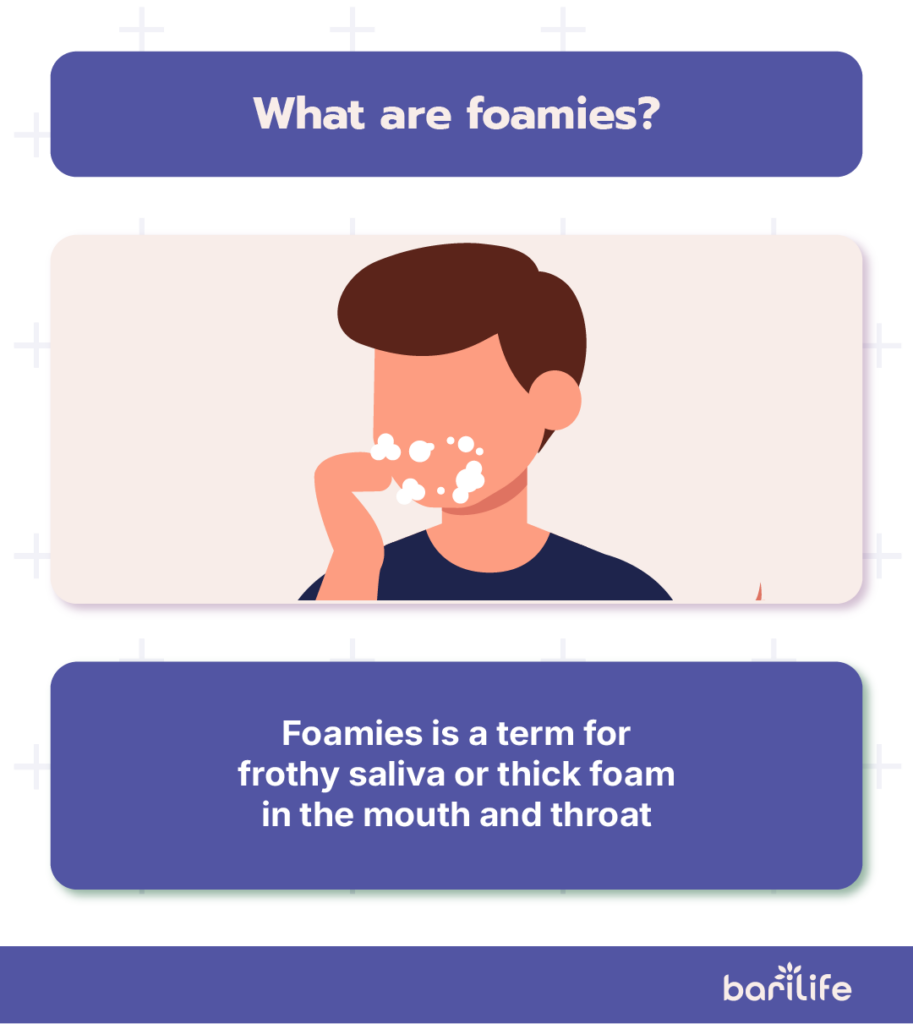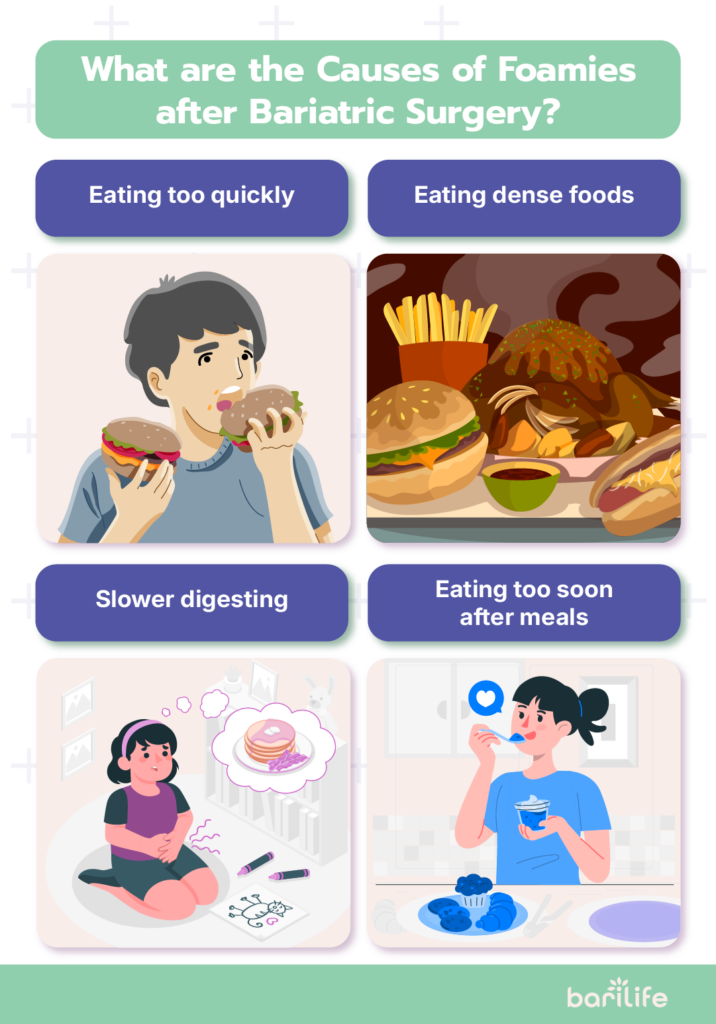Key Takeaways
- Foamies describe thick, frothy saliva that can build up after eating in people who’ve had bariatric surgery.
- Practicing mindful eating, avoiding certain foods, and staying hydrated can help reduce and manage foamies.
- Regular follow-ups with healthcare providers and dietary advice from specialists can also help manage this complication and set the individual up for long-term success.
While bariatric surgery can be an amazing life-changing journey, it often comes with some surprising side effects, such as constipation after bariatric surgery, gas after bariatric surgery, and dumping syndrome after bariatric surgery. Some of these effects, like foamies or diarrhea after bariatric surgery, you may never even have heard of until you are experiencing them.Alongside these, it’s essential to understand the need for bariatric vitamins, especially bariatric multivitamins and bariatric vitamins chewable, to support overall health.
While the term “foamies” may sound playful and fun, the experience is anything but. Foamies describe a thick, frothy saliva at the back of the throat, making eating difficult. Not to mention, it feels uncomfortable and may cause nausea after bariatric surgery or vomiting.
Researchers have conducted limited studies on foamies. But, for many post-bariatric patients, it is a real part of their recovery. Social media and online chats are full of questions about how to deal with foamies, along with other issues like heartburn after bariatric surgery and dry mouth after bariatric surgery.
In this guide, we’ll break down everything you need to know about foamies, what foamies are, why they happen, and how you might decrease them.
Table of Contents
What are foamies?

“Foamies” is a term people started using to describe frothy saliva or thick, slimy, foam that builds up in the mouth and throat, usually after eating. It can also be a type of vomit that happens after an episode of vomiting.
For patients who use bariatric protein shakes or consume bariatric protein bars as part of their recovery, the types of food and supplements they choose may influence the frequency and intensity of foamies. Certain nutrient-dense options, like bariatric snacks or bariatric calcium chews, could also play a role in managing this condition.
People with foamies are often surprised by this. They find it hard to deal with the complication. Sometimes foamies make them nauseous. Some can’t eat because of it and may even feel hungry after bariatric surgery.
It’s common for people with foamies to have recently undergone bariatric surgery. Specifically, procedures that reduce the stomach size, such as gastric bypass or sleeve gastrectomy.
Who is Affected by Foamies after Bariatric Surgery?
Anyone who’s undergone bariatric surgery, particularly restrictive procedures, such as gastric bypass, sleeve gastrectomy, or lap band surgery, can experience foamies.
The commonality between these surgeries is that they alter the size and function of the stomach, which can lead to digestive challenges, including the build-up of foam.
Foamies can also develop if you don’t follow your post-surgery guidelines on what and how much to eat. Eating too fast or too much food that’s hard to digest may trigger foamies.
What are the Causes of Foamies after Bariatric Surgery?
There are several factors that may cause foamies after bariatric surgery.
- Eating too quickly: Eating your food too fast can put a strain on your stomach and cause your body to produce more fluid to try and aid in digestion.
- Too large of bites and not chewing enough: Taking big bites and not chewing your food may cause foamies. Your stomach breaks food down with acid. But, it needs your teeth to grind the food into smaller pieces first.
- Eating dense foods: Eating foods that are hard to digest, such as fatty meats and high-fiber foods, may cause the stomach to work extra hard and cause foamies.
- Slower digesting: The changes made to your stomach and digestive tract can slow down the rate at which food moves through your stomach and intestines. Having food in the stomach longer may lead to your body producing foamies.
- Carbonated beverages: Drinks with carbonation can put extra gas in your digestive system, which may further increase the risk of foamies.
- Eating too soon after meals: Not giving your body enough time between meals to digest and move the food along may cause a back-up that can lead to foamies.

What are the Symptoms of Foamies after Bariatric Surgery?
People with foamies describe the condition as being quite uncomfortable. The severity and frequency of the foamies can vary from person to person.
The classic symptom of foamies is the characteristic thick, frothy saliva that may make a person feel nauseous or want to spit frequently.
Some individuals also describe foamies as vomit that is frothy or foamy in texture, with lots of airy bubbles. Foamy vomit is typically less dense compared to regular vomit.
People often describe it as a feeling of fullness that can feel like pressure in the throat.
Some people really don’t feel like eating when they have foamies, and have to retrain themselves to eat properly.
How common is “Foamies after Bariatric Surgery”?
The occurrence of foamies after bariatric surgery can vary significantly from person to person, and the good news is that not everyone who undergoes this type of surgery will experience them.
However, foamies are a common early post-surgery symptom, particularly in the first few months as the body adjusts to the new digestive structure.
The likelihood of experiencing foamies may also depend on the type of bariatric procedure you have. If you have gastric bypass, you have a higher incidence of foamies.
Fortunately, most people report that foamies decrease over time, especially when they make the proper dietary adjustments.
Ways to Prevent and Manage “Foamies”
If you are struggling with frequent foamies, here are several things you can do that may help.
- Practice mindful eating: This means taking the time to eat slowly, eating small bites, and chewing your food thoroughly.
- Choose suitable food: Eating foods that are easier to digest, such as lean proteins and soft fiber foods like canned vegetables or fruits, can help.
- Stay hydrated: Drinking water between meals helps you stay hydrated and aids in digestion. However, it’s best to avoid drinking during meals as your stomach has limited space, and water dilutes stomach acid.
- Stay upright after meals: Avoid laying down too soon after meals and keep yourself upright for at least 30 minutes.

Importance of Professional Guidance
After bariatric surgery, it’s important to have regular follow-up visits with your healthcare provider. They can identify and address any complications, including the occurrence of foamies.
These check-ups provide time for your healthcare provider to assess your recovery and offer any guidance on complications, such as foamies, that may arise. It also gives you the time to ask questions about any symptoms you are experiencing after your surgery.
You may also want to consider seeking the advice of a registered dietitian who specializes in bariatric surgery. These specialists can be incredibly beneficial and provide personalized guidance based on your health needs and goals.
Conclusion
While foamies, a thick, frothy, white saliva foam may be an uncomfortable and frustrating experience for some, understanding their cause and implementing a few management strategies can help reduce their impact.
To reduce your likelihood of foamies, practice mindful eating, making thoughtful food choices, and staying properly hydrated. It’s also important to keep up with your regular check-ups with your healthcare provider. You may also want to seek guidance from a registered dietitian to learn ways to reduce your foamies.
If you want to learn more, why not check out these articles below:
References
Torres, E., (2023). What causes foamies after bariatric surgery? Moon Gastric Sleeve.




What are your tips and tricks to post-bariatric success?